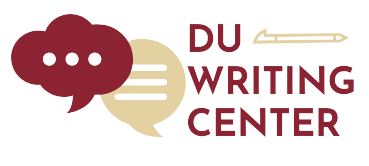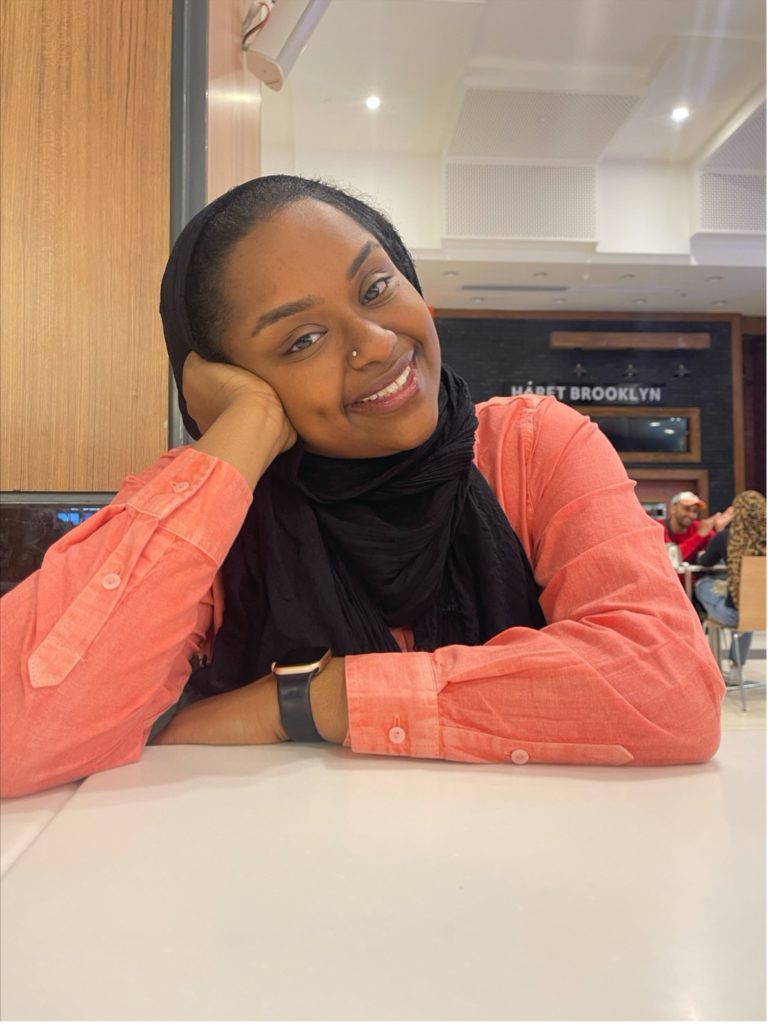by Kamila Kinyon
This spring, we will be publishing a series of spotlight articles about multilingual students at DU. These articles are based on interviews that Kamila Kinyon conducted about students’ memories of becoming multilingual, their connection to their heritage language, and their experiences at DU. This project is funded by a 4D Infusion Grant awarded for 2022-23 to Juli Parrish and Kamila Kinyon. We welcome this opportunity to celebrate DU’s multilingual speakers and writers.
A DU Honors student majoring in molecular biology, Shujan plans to go to dental school after graduating in 2024. She was born in Denver to Sudanese parents who came to the U.S. as refugees in 1999. Growing up with Arabic as her native language, she is fully bilingual, reading and writing both English and Arabic fluently. She sees multilingualism as an advantage both for her personal life and for her future career since she will be able to communicate with patients from diverse backgrounds. Arabic is particularly important to Shujan as a heritage language: “I do have a really deep attachment to Sudan and my culture and my language.”
While she was growing up, Shujan’s parents had a rule that she and her brother could not speak English at home so that they would become attached to their culture and learn Arabic: “It was an odd rule but then at school and outside in the community, I was always speaking English.” When her parents found the kids had a good grasp of the language, Shujan mentions that “they became more lenient.” She would sometimes slip in some English words, and she even found her mom occasionally inserting English words into Arabic discourse, even though English was her second language. Especially when communicating with her brother, Shujan often speaks English now. This mixing of languages is typical of many immigrant communities.
As a result of growing up fully bilingual, Shujan even switches which language she thinks in: “When I’m speaking to my friends in English, I would forget what I’m saying in English and like think of it in Arabic…It was a struggle in this way.” Switching between languages serves as both a challenge and an asset, since thinking in one’s heritage language more closely enables communicating about one’s culture: “I do switch back and forth because…speaking in Arabic is also tied to the culture. If I’m explaining to my friends something in our culture, it’s harder for me to think in English…and I always tell my friends, ‘I wish you understood Arabic.’”
Shujan identifies as Sudanese American. It is especially important for her to preserve aspects of her Sudanese heritage even while living in the U.S. She relates the difficulties involved in preserving this hybrid identity, since she sometimes feels like she doesn’t fully fit in in either culture: “Surrounded by friends who lived the American lifestyle, it was hard for me to really fit in. Even when I would travel back home to Sudan, my cousins would make fun of me and aunts and uncles were saying ‘you’re American’ and I’m like ‘I’m not American.’” While visiting Sudan, Shujan gained a deeper connection to her family and its culture.
Shujan emphasized her bicultural vision in her college application personal statement, where she discussed how the Sudanese revolution and the subsequent move to the U.S. shaped her Sudanese American identity. At DU, Shujan has also found opportunities to write about her identity in the context of writing and communications courses: “Every time I would be given that opportunity, I would immediately jump on it and write about my multilingual perspective.” Having two languages makes it possible for Shujan to incorporate translingual elements into her essays and to utilize the full potential of two different linguistic systems.
Here is Shujan’s advice for other multilingual speakers: “(Being) bilingual is like magic, and because it’s magic, you can spread your magic.”

